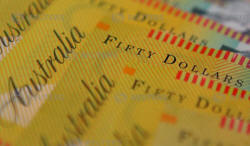Dollar trapped in ranges on trade war fears
 Send a link to a friend
Send a link to a friend
 [September 07, 2018]
By Saikat Chatterjee [September 07, 2018]
By Saikat Chatterjee
LONDON (Reuters) - The Australian dollar
skidded to its weakest level in more than 2-1/2 years as fears over an
escalation in the trade conflict between the United States and China
dominated concerns, while safe-haven currencies such as the franc and
yen gained.
With a public comment period for proposed U.S. tariffs on an additional
$200 billion worth of Chinese imports ending at 0400 GMT, markets edged
lower as investors waited for a fresh salvo to be fired in the ongoing
Sino-U.S. trade war.
"The dollar moving in different directions against the Aussie and the
yen is typical of a risk-off move as fears of trade war escalation and
contagion in emerging markets remain main drivers," said John Marley, a
senior currency consultant at FX risk management specialist
SmartCurrencyBusiness.

An emerging market currency index edged higher on Friday but is poised
to register its biggest weekly loss in three weeks.
Among developed currencies, the Australian dollar fell more than half a
percent to its lowest level since February 2016 at $0.7138 as concerns
that any escalation in trade conflict would hit export-oriented
economies such as Australia, which have China as their biggest trading
partner.
The yuan was relatively stable in the offshore market in Hong Kong as a
spike in overnight borrowing costs deterred short-sellers of the Chinese
currency.
The dollar held in relatively tight ranges against other major peers
such as the euro and pound, with the market bracing for the highly
anticipated U.S. jobs report due later in the session.
[to top of second column] |

Australian dollars are seen in an illustration photo February 8,
2018. REUTERS/Daniel Munoz

Ulrich Leuchtmann, a currency strategist at Commerzbank in Frankfurt, said broad
concerns were giving a boost to safe-haven currencies and that markets would
remain more focused on trade war headlines than upcoming U.S. economic data
unless there is a big downward surprise.
August's U.S. non-farm payrolls report is due at 1230 GMT. The U.S. economy is
expected to have added about 191,000 jobs last month, with average earnings at
0.2 percent month-on-month compared to 0.3 percent from July.
The Federal Reserve is poised to hike interest rates this month, its third
monetary tightening move in 2018, and the employment data is expected to shape
investors' near-term outlook on interest rates.
While markets waited for the next round to be fired in the U.S- China trade
conflict, U.S. President hinted to a Wall Street Journal columnist that he might
take up trade issues with Japan, according to CNBC television.
The British pound jumped on Friday after European Union negotiator Michel
Barnier said the EU was open to discussing other "backstops" on the Brexit
issue.
(Reporting by Saikat Chatterjee; Editing by Catherine Evans)
[© 2018 Thomson Reuters. All rights
reserved.] Copyright 2018 Reuters. All rights reserved. This material may not be published,
broadcast, rewritten or redistributed.
Thompson Reuters is solely responsible for this content.
 |